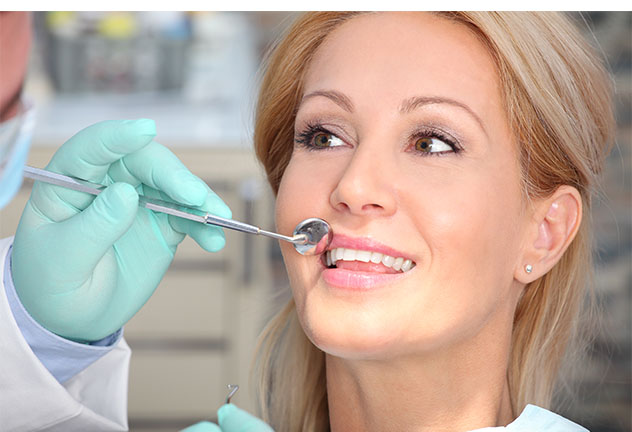 When it comes to dental health, women have a unique set of concerns. The ebb and flow of hormones throughout their lives can lead to sensitive and swollen gums and other dental issues. This month, as we observe International Women’s Day, we’re spotlighting 5 factors that impact women’s dental health.
When it comes to dental health, women have a unique set of concerns. The ebb and flow of hormones throughout their lives can lead to sensitive and swollen gums and other dental issues. This month, as we observe International Women’s Day, we’re spotlighting 5 factors that impact women’s dental health.
#1 Fluctuating hormones
During puberty, the surge in production of estrogen and progesterone can increase the blood flow to the gums and change the way gum tissue reacts to irritants in plaque, causing the gum tissue to become red, tender, swollen, and more likely to bleed during brushing and flossing. That same hormonal surge occurs during menstruation, possibly leading to swollen gums, swollen salivary glands, and maybe even canker sores.
Menopause can likewise bring numerous dental health changes, not just because reduced hormone production, but also as the result of medications taken to combat health issues. These changes can include altered taste, burning sensations in the mouth, greater sensitivity to hot and cold foods and beverages, and decreased salivary flow which can result in dry mouth and eventual tooth decay and gum disease. Many women are at risk for bone loss when they reach menopause – and bone loss in the jaw frequently leads to tooth loss. Receding gums, which is prevalent in aging, can be a sign of bone loss in the jawbone. In addition, receding gums expose more of the tooth surface to the decay-causing elements.
#2 Pregnancy
The hormonal tide that occurs with pregnancy often causes inflamed gums that are particularly sensitive to plaque. Occasionally, they even cause “pregnancy tumors” to develop on a woman’s gums. These benign inflammatory growths occur when swollen gums become irritated and usually shrink soon after pregnancy is over. If not, these pregnancy tumors can be safely removed after the baby is delivered. Despite gum sensitivity, proper dental hygiene is critical during pregnancy; some studies appear to indicate that women with periodontal disease may be at increased risk for pre-term, low birth-weight babies.
#3 Oral contraceptives
Birth control pills can contribute to bleeding, swollen, and sore gums because they contain progesterone or estrogen. Women using oral contraceptives have a much greater chance of developing a painful condition known as “dry socket” after an extraction. This occurs when a blood clot does not form properly after an extraction and results in a localized, painful inflammation. Be sure to inform your dentist if you are using oral contraceptives and having a tooth extracted.
#4 Dieting
A healthy, balanced diet is a key factor in a woman’s overall dental health. Unfortunately, many “fad diets” deprive women of nutrients critical to good dental health. Cutting calories may be an effective way to lose weight, but reducing your food intake too much can wreak havoc on your health, since it depletes your body of necessary minerals and vitamins. Malnutrition is bad news all around, but for your mouth it can mean a weakened jawbone (causing your teeth to move or fall out), softened enamel (increasing your chance of cavities), and deficient gums (making you vulnerable to gum disease).
Eating a diet low in fat can interfere with the absorption of fat-soluble vitamins, such as A, D, E and K. Vitamin D is especially important for oral health — it helps the body absorb calcium. When your body can’t absorb calcium, your teeth and bones start to break down. Considering going on a low- or no-carb diet? One very noticeable side effect is breath that smells like nail polish remover. The unique scent of acetone — or sometimes rotten fruit — is a tell-tale sign of ketosis, the process in which your body starts burning fat instead of carbohydrates for fuel, releasing chemicals called ketones. High levels of ketones can induce ketoacidosis, an illness in which your blood levels grow dangerously acidic, causing your body to burn muscle instead of fat. Ketoacidosis can cause intense fatigue and even damage your heart.
#5 Smoking
Smoking causes a host of health issues, and its effect on a woman’s oral heath can be catastrophic. Not only is smoking strongly linked to oral and lung cancer and heart disease, it can lead to painful and disfiguring dental conditions including mouth lesions, receding gum lines, and tooth loss. While the incidence of smoking among women is starting to decline in developed countries, it is climbing sharply in in many developing countries. It may be a difficult habit to quit, but doing so will add years to your life and improve your dental health, your overall health, and your appearance.
Schedule an Appointment Today!
From routine cleaning and exams to advanced restorative treatments, the professionals at Walbridge Dental provide complete family dental care to families in the Millbury community. Contact us online to set up a visit now or call us at 419-836-1033.
Connect on Social Media!
